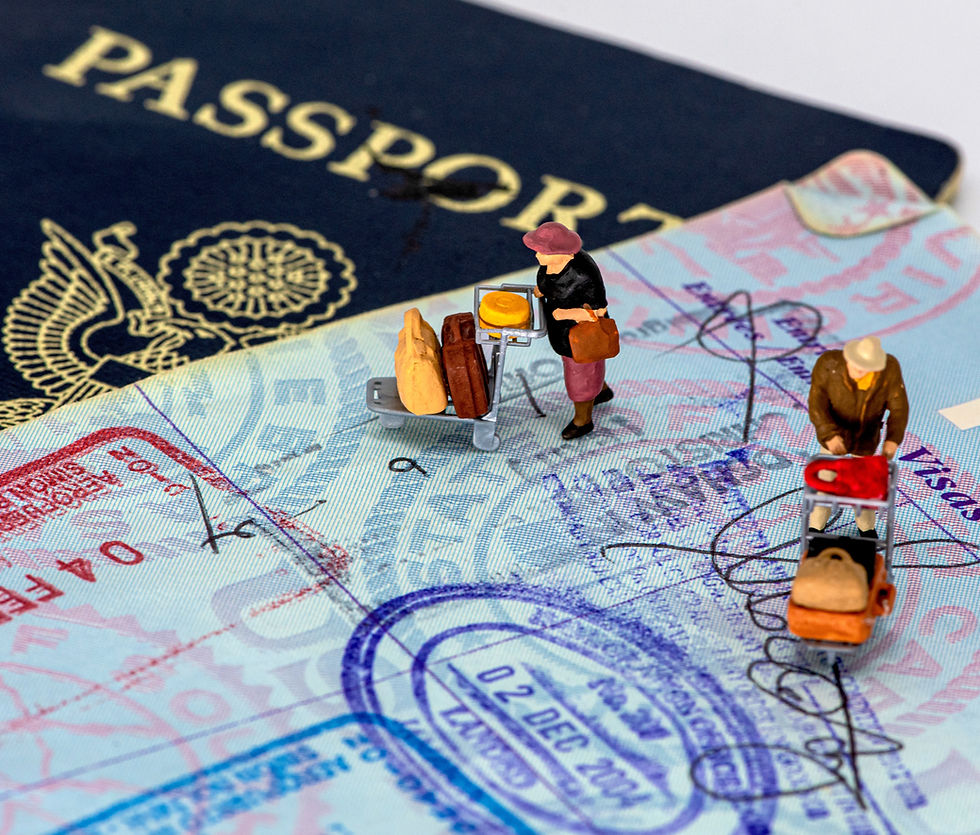Eight (8) Skills For A Successful Visa Application
- Uthman

- Oct 20, 2022
- 4 min read
Updated: May 19, 2024
Chances are, you are familiar with the business of travel agents across the world. Specifically in Africa, where I'm from, travel agents are persons/ established businesses who offer visa application and consulting services for travelers at [often exorbitant] fees.
For my travels, I have encountered a few, with prices ranging from as low at $100 to $1,500 for different destinations. I'm finding that a lot of travelers with weaker passports battle a lot of anxiety about visa application processes, thus deferring to visa agents.
Thankfully, I have had successes in applying for visas to a number of destinations is Africa, Europe & Asia and have gathered notes on skills that will be useful for your next visa application, so you can build the muscle too and save $$$ in the process. I group them into 'hard' & 'soft' skills below.
Five (5) Hard Skills
1. Written communication skills
Keeping in mind that Visa officers receive tons of applications and documents on a daily, if not hourly basis, one of the most important skills that will be most beneficial to your application, will be your written communication skills. Ensure that your writing is legible, clear and easy to read. Opt for succinct, concise expressions in your letters and avoid verbose or badly worded texts. Always remember; your document would communicate independently on your behalf, before you get a chance to do so in person/virtually.
It's best to put your best foot forward.
2. Build travel history
Building travel history is as important a skill as being able to communicate what that history shows, and why this should cause a favorable response from the visa officer. Like all skills, this doesn't happen overnight. It requires planning, prioritizing travel and saving to explore places at your convenience. A good way to build travel history is to visit countries with lesser restrictions on travel; visa-free, visa on arrival or e-visa options for your passport is an excellent way to do this. Visit www.passportindex.org to learn about requirements for different passport holders.
3. Diligence
Another important skill that will prove useful to your visa application process is diligence. Diligence speaks to showing care or conscientiousness in one's work or duties. Simply put, a diligent applicant is likely to read carefully, understand instructions and follow guidelines to utmost satisfaction. Different consulates/ embassies have different guidelines for visa application; a few known ones include requests to complete visa forms in BOLD letters, a specific color of ink eg; black, specifications on sizing eg: an American size passport photo, amongst others.
Exhibiting diligence in your application requires that you read and follow the specific embassy's guidelines in submitting a good application. Diligence communicates discipline and commitment, which are traits that will create trust for your application.
Diligence speaks to showing care and conscientiousness in one's work or duties. A diligent applicant is likely to read carefully, understand instructions, and follow guidelines to utmost satisfaction.
4. Research Skills
Place yourself in the shoes of the visa official for a second, and imagine you were interviewing an applicant to grant access to your country for tourism, business or leisure. Would you be trusting of someone who knows nothing or too little about the country they hope to spend x amount of time in? I doubt it. Therefore, it's important that you use this opportunity to brush up on your research skills and learn some information about your desired destination. It'll not only present you as a great candidate, but help your stay in the country be as smooth and enjoyable as possible.
5. Emphasis on ties to your home country
Owed to the effects of illegal migration and socio-economic issues globally , visa processes have become increasingly stringent, as countries seek to protect their sovereign interests and that of their nationals. One of the causes of visa rejections is the lack of convincing ties s to the applicant's home country. For this reason, it's imperative that your visa application clearly shows your willingness to return to the home country after the authorized duration. Return flight itineraries, full-time employment, family and established enterprises in the home country are some great ways to depict strong ties to your home country.
Three (3) Soft Skills
1. Oration
For in-person or virtual visa interviews, it's important to remember that an interview of any kind, is a conversation between parties. Hence, it'll be most beneficial for your interview to give some sense of warmth and genuineness. Maintain a calm posture, speak well and clearly and be willing to offer answers to questions or clarifications that the visa officer(s) may have.
2. Immaculate appearance
It may sound like a cliché, sure. However, it is undeniable that perception is subjective and different people (yes, the visa officer too) create impressions based on a host of variables, appearance included. It's important to look your best (this is subject to interpretation, of course), sharp and poised for your visa appointment. It's important to note that Immaculate appearance also impacts your confidence, self-esteem and sense of self. This will go a long way in aiding a successful application for your travels.
3. Composure
This can be an added advantage from appearing immaculately and having good oration skills. Composure relies on your body language and other non-verbal cues to communicate trustworthiness and confidence. It helps to remember that visa officials are trained as control agents; can spot inconsistencies, nervousness or discomfort from an applicant. Try to keep calm, do not fidget, and relate with the officials as you would a colleague, friend or acquaintance.
I hope you find these helpful in your future travel planning!
Best of luck and safe travels!










Comments